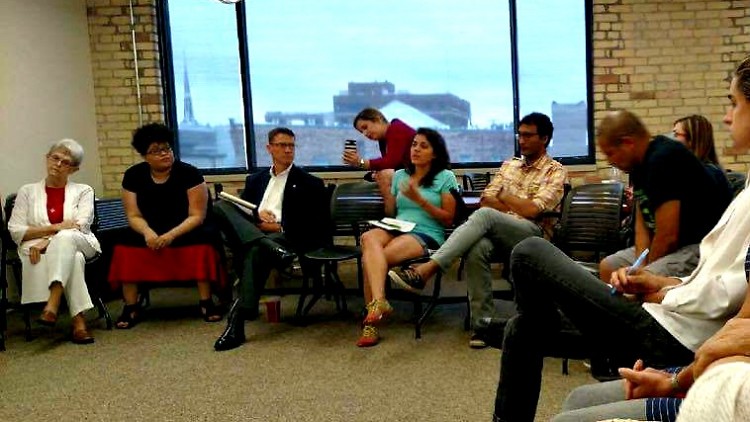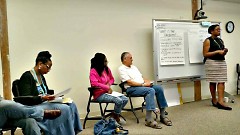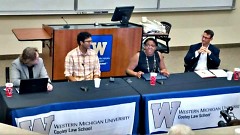Each day I wake up, I am confronted with a singular truth; the world that lies outside my front door has no space for my pain. Not only is it void of space for my pain, my ability to achieve economic mobility and professional success essentially hinges on my ability to be the appropriate mix of knowledgeable (but not too much), accommodating (like a flight attendant) and gracious for the opportunities, whether they are actually someone else’s means to an end or not, that have been bestowed upon me. There is no space to address the physical and emotional damage that results from the Academy award-winning performance I am expected to maintain from a script I have never had access to. There is no room to discuss the trauma of working in spaces so racially and sexually charged they caused, what I later learned, were panic attacks. There is no space to discuss how this performance perfection is actually killing my body – because stress actually has direct outcomes on an individuals’ physical well being.
If you have made it to this point, then the lasting psychological trauma of those experiences should be no surprise.
However, I do not have permission to grieve publically nor am I capable. Life has hardened me – so my body can survive and my soul establish an artificial peace. While that may seem cold, I’m willing to speculate that many folks around you in the workplace, in your neighborhood, at your place of worship and walking past you at the park, are in some way doing something similar. In the racial equity world we call this covering. Many of the problems with covering are obvious, but there are a few things that evolve from that continued mode of existence: apathy. The lies we tell ourselves to survive become truths. The false truths become social norms. Those social norms are codified by policy to reaffirm this widely accepted action.
Apathy derived from a need to survive for some, paired with the privilege of others maintains a silence that is undoubtedly to the detriment of society. Over the last few weeks we have seen this play out in the national political discourse, police brutality and the continued erasure of immense brutality directed towards black women and transgender women of color. Locally we see this in the striking silence around the brutality directed at a 14-year-old black Grand Rapidian racially profiled and left permanently affect by an officers decision to beat him with a flashlight resulting in 18 stiches in his head. We see this in the inability for people to hear the narratives of others, when it is not an experience they can directly identify with.
I am often asked the question, “Well, what do we do about this?” And, simply put, there is not a singular solution or a guaranteed fix. But, there are ways to address it and there are individuals and organizations in Grand Rapids doing just that. There are faith-based communities talking to their congregants about racial inequity. There are organizers highlighting brutality and disrupting systems in hopes of providing an education to those existing in bubbles where the discourse never moves or makes space for differing perspectives. There are students seeking to organize, desiring to learn…waiting for adults to teach them and, for some, get out of their way. There are organizations changing policies that reinforce disparate outcomes for minority groups. All of these actions matter and all of them must exist because each inherently addresses an element of what is a complex equation created by people. Much like a rubix cube, the solution exists – we just have to pay attention to all of the colors that make up the cube.
There is, however, a very visible space that is missing: space for individuals to discuss their hurt, confusion, ignorance, aggravation and sadness. A place where people can hear the experiences of those neighbors they have never met. A neutral ground where pain of the disenfranchised is elevated and the opportunity to be a listener is valued as much as the voices that are lifted.
Last year, Partners for a Racism-Free Community piloted a community dialogue model that encouraged Grand Rapidians to have honest discussions about their experience with racism in the area. The extent to which this space was controlled was minimal with the primary guidelines establishing privacy rights and a single goal: to create a space where the community can have meaningful dialogue about racism. And last year with the participation of over 300 members of the community, we did just that: talked and listened.
We have reestablished that space this year, with four opportunities for members of the community to talk about what they see, how they feel, their misconceptions and ultimately share their stories. I often hear people say, “we don’t need more conversation, we need action,” to which end I agree with half of that sentiment. We do need action, but uninformed action often proves to render marginally productive results. Quantitative data can only give you the numbers – figures we can choose to familiarize ourselves with or advocate for more transparency on. Numbers do not display the emotional costs of racial disparity. Numbers do not change the socialized fear an individual has towards a person they have never had a meaningful exchange with, simply because the color of their skin evokes fear.
People in this community need to heal - an impossible goal when you’ve created a space where no one is listening.
On August 26, 2016, Partners for a Racism-Free Community will create space for people to share their stories, vocalize their pain but most importantly a space that encourages people to listen. This space will not end racism. This space will not solve racism in Grand Rapids. However, this space will encourage a community that is more comfortable creating silos of silence to tear down those walls.
This space is not meant to heal you (because healing spaces look different and have different rules based on who it’s for) but perhaps it may help you realize that you are in need of healing in the first place.
Join us for the first of four #RacisminGR Community Conversation’s on August 26 at ICCF from 5:30 p.m.-7:00 p.m. This event is free and open to the public. No registration is required.
For more information about Partners for a Racism-Free Community and our Community Conversations, visit www.prfc-gr.org.
The Rapidian, a program of the 501(c)3 nonprofit Community Media Center, relies on the community’s support to help cover the cost of training reporters and publishing content.
We need your help.
If each of our readers and content creators who values this community platform help support its creation and maintenance, The Rapidian can continue to educate and facilitate a conversation around issues for years to come.
Please support The Rapidian and make a contribution today.



